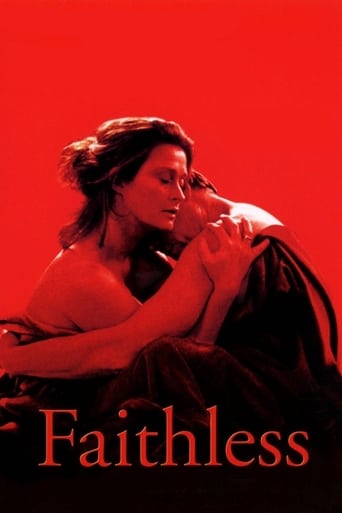jonr-3
Last night, I watched "Faithless," and I've thought about it almost constantly since. A magnificent, heart-rending film. Surely this is Bergman's finest script. It's absolutely uncompromising in its unsentimental, clinical, story-telling, and filled with that compassion devoid of hope that is Bergman's trademark, and his own world view.Hopelessness as the key to dignified human life, day by day, would seem to be an apt description of Bergman's philosophy.I won't give away the dénouement of the story, in case you are fortunate enough not to have seen it yet, and to be able to see it. Let me just say that I was completely surprised by the plot twist near the end--it caught me entirely off-guard, and later I felt that I should have seen it coming, but I didn't. That's the mark of a master writer, to be able to take the reader (or viewer) unaware. Ingmar Bergman could have had a career as a mystery/suspense writer if he'd wanted to. (I'm glad he didn't.)
The story of "Faithless" is that of a marriage plunged into chaos by the aftermath of one chance phrase, uttered by a close friend of the married couple to the wife after a late-night supper. With a dazzling propensity for making wrong choices, which, if we're honest, we'll all recognize existing in our own lives, the protagonists rush headlong into a hell of their own making. At the center of the story, like a small, still, silent observer, resides Isabelle, the nine-year-old daughter. The effect of the grown-ups' actions on this poor child renders the story all the more poignant and horrifying.But what I've sketched here (omitting the surprise towards the last) is only half the story. And in a sense it's not even the real story. For Marianne and Markus (the married couple), David (the mutual friend), Isabelle, and the other main characters don't, in a sense, even exist. The film opens in the study of an elderly film director (played by Erland Josephson, close friend and colleague of Bergman, and the actor who played Joseph, the husband, in "Scenes from a Marriage"--where his character's wife's name, Marianne, matches that of the character played in this film by Lena Endre, in an unforgettable tour-de-force amounting to a two-and-a-half-hour monologue; Marianne, in the earlier film, reminiscent of this one in many ways, was played with similar bravado by this film's director, Liv Ullman, long-time associate of Bergman and for some years his lover). The setting might well be Bergman's own study in his house on the remote Swedish island where he's lived in isolation for the past several years. The desk is slightly more cluttered than Bergman's own (which is adorned only with a clock and a photograph of his wife, with whom, he admits, he still has conversations, years after her death, which devastated him and helped drive him into "exile"). The room is almost bare otherwise, immaculately kept, furnished with a stereo, an armchair, a couple of lamps, a few photographs on the wall. The exterior scenes were undoubtedly shot on location on the actual island.The "director" is seated at his desk, talking aloud to an empty room, but addressing "Marianne." First as a shadow behind him, then fully visible seated on a window-seat, Marianne appears at his bidding. The movie goes on from there--sessions of talk in the director's study, the director mainly asking pointed questions, Marianne, and later David, sometimes hesitant or afraid to answer, but gradually revealing the painful facts of their excruciating misconduct. Significantly, at a crucial point the director comforts each of these "imaginary" (but in the film very real) creatures by a caress to the cheek-as if wiping away a child's tears. At the end of the turbulent story, he's left alone with his manuscript--and the dark, rolling sea. He walks slowly, awkwardly along the pebbly beach, lost in thought, just as Bergman does every day.I believe that, thanks to the incalculable combined talent of Bergman and Ullman, this film offers the viewer catharsis, as in the Greek tragedies. I certainly have felt very different in the hours since viewing it. If "religious" leaders had the courage and honesty to offer their faithful the same hopeless but compassionate view of life as this film, and Bergman's own outlook, afford, then I think the world would be a much better place.
Ironically, Bergman's point of view is largely the result of a childhood spent under the heavy hand of Protestantism. (His father was a stern pastor.) But the result has been Protestantism with a twist: in a godless world, we doom ourselves to shame and horror, yet we can, somehow, still find the dignity to go on living one day at a time, doing the best we can with our pathetic lives. And that's the best we can do. There is no redemption, not even in art: but there may be some clarification, if we're lucky.In the end, all we had was ourselves and one another. And we did what we thought we had to do.
Tiburón
There is not a strong conflict. The infidelity issue is not a problem in this movie. It is affronted naturally, despite that the husband kills himself, it is not believable, because he also had a lover for years and was not happy with his wife. I liked Marianne (Lena Endre)acting, she was convincing. Husband and wife are not happy, lover and lover look bored, unhappy, flat. This is the most boring movie I have ever seen. Probably if the director cuts its lenght to 90 minutes or even 50 minutes, she could get to the point. I love foreign movies, but in this case I do not care if this movie was written by Bergman and directed by his ex-wife, Liv Ullman, it is a sleep pill with a different name.

